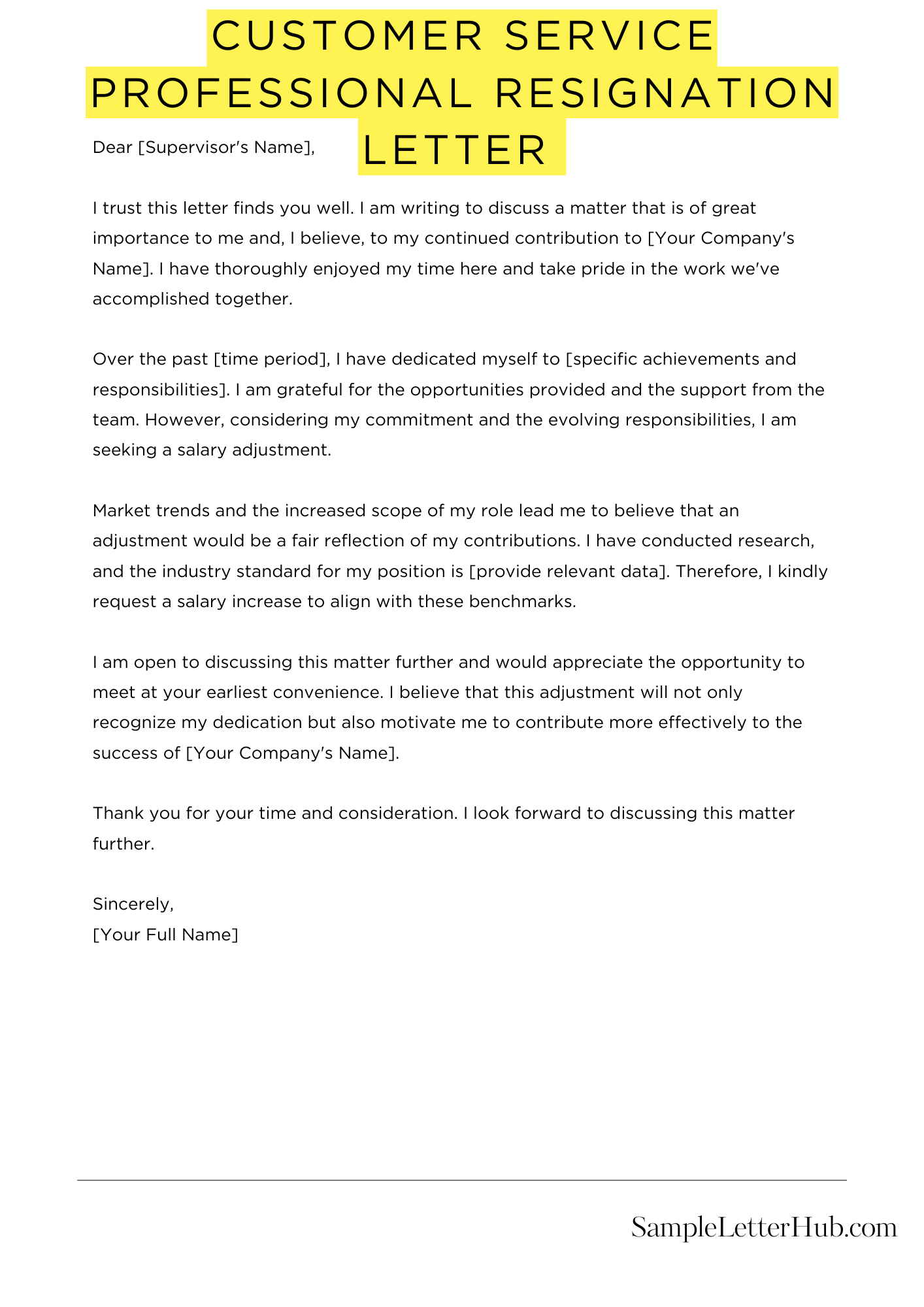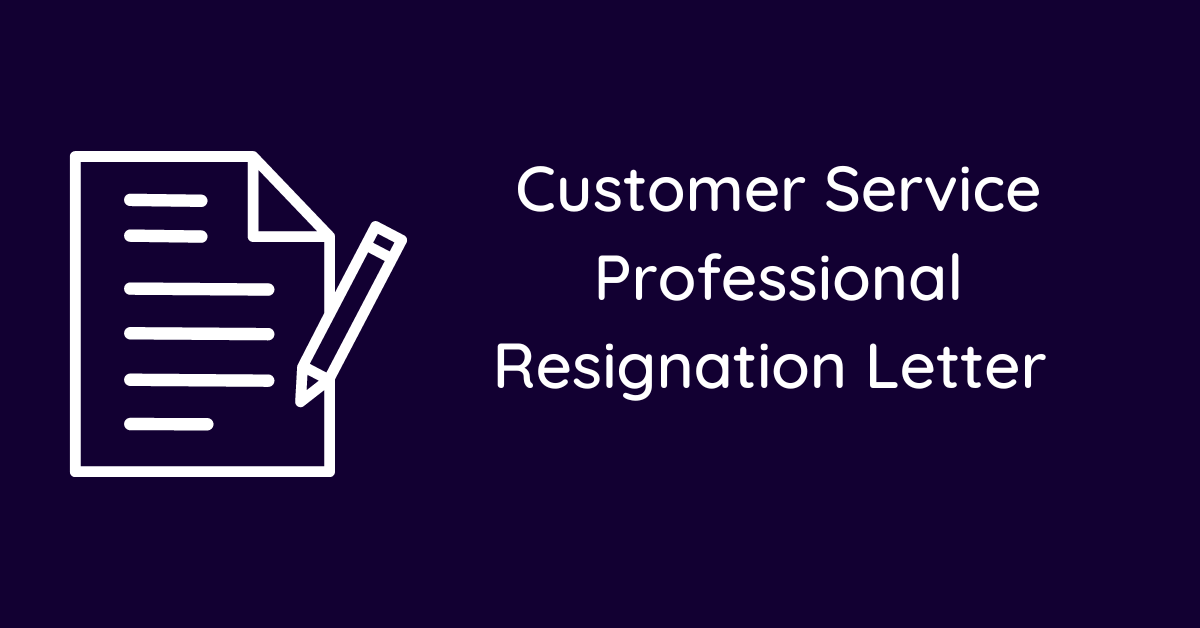When it comes to leaving a job, one way to do so is by writing a clear and professional resignation letter. This letter should explain your decision to leave and be polite and humble in its tone. In this article, we will share an example of a customer service professional resignation letter with you.
A customer service professional resignation letter is a formal document that you submit to your employer to inform them of your decision to leave your position. It should be well-written and error-free, and it should clearly state your reasons for leaving.
Below, we have shared a template/example customer service professional resignation letter that you can use. Feel free to adapt it to your own needs.
Customer Service Professional Resignation Letter
Dear [Manager’s Name],
Please accept this letter as formal notification that I will be resigning from my position as Customer Service Professional at [Company Name], effective [last date of employment].
During my time here, I have valued the opportunity to contribute to the company’s success and provide exceptional customer support. I have learned invaluable skills and gained valuable experience that I will carry with me in my future endeavors.
I want to express my sincere gratitude for the support and guidance I have received from you and the team. I wish [Company Name] all the best in the future.
Please let me know if there is anything I can do to ensure a smooth transition during my departure.
Sincerely,
[Your Signature]
Short Customer Service Professional Resignation Letter Sample
Please accept this letter as formal notification that I am resigning from my position as Customer Service Professional at [Company Name]. My last day of employment will be [Your Last Day]. Thank you for the opportunity to grow and learn during my time here. I wish you and the company continued success. I am happy to assist in the transition process to ensure a smooth handover of my responsibilities.
I wish you all the best with your customer service professional resignation letter.
When it’s time to say farewell, expressing your gratitude and best wishes can make the transition smoother:

How to Write a Customer Service Professional Resignation Letter
1. Start with a Professional Salutation
Begin your letter with a formal salutation, such as “Dear [Manager’s Name].” This sets a respectful tone and shows that you value your manager’s time.
2. State Your Resignation Clearly
In the first paragraph, state your intention to resign from your position as a customer service professional. Be clear and concise, and include the date of your last day of employment.
3. Express Gratitude and Appreciation
Take this opportunity to express your gratitude for the opportunities and experiences you’ve gained during your time at the company. Mention specific projects or initiatives that you’re proud of, and thank your manager for their support and guidance.
4. Offer to Help with the Transition
Let your manager know that you’re willing to help make the transition as smooth as possible. Offer to train your replacement or assist with any other tasks that may need to be completed before your departure.
5. End with a Professional Closing
Close your letter with a professional closing, such as “Sincerely,” or “Best regards.” Include your signature and typed name below the closing.
Customer Service Professional Resignation Letter: 6 FAQs
Resigning from a customer service professional role can be a daunting task, but it’s important to do it professionally and respectfully. Here are some frequently asked questions and answers to help you navigate the process:
1. What should I include in my resignation letter?
Your resignation letter should include the following:
- Your name and contact information
- The date
- The name of the company and your manager
- A statement that you are resigning from your position
- Your last date of employment
- A brief expression of gratitude for the opportunity to work at the company
2. How should I format my resignation letter?
Your resignation letter should be formatted in a professional and easy-to-read manner. Use a standard font size and style, and left-align your text. Keep your letter brief and to the point, and avoid using jargon or technical terms.
3. When should I submit my resignation letter?
It is generally advisable to submit your resignation letter two weeks before your last date of employment. This will give your employer time to find a replacement and ensure a smooth transition. However, if you have a particularly close relationship with your manager or if there are other circumstances that warrant it, you may want to give more notice.
4. What should I do if I am asked to stay?
If your employer asks you to stay, it is important to be polite and professional. Thank them for the offer, but reiterate your decision to resign. You can also offer to help with the transition in any way that you can.
5. What should I do if I am not happy with my job?
If you are not happy with your job, it is important to talk to your manager about your concerns. They may be able to make changes to your role or the company culture that will make you happier. If you are unable to resolve your concerns, you may want to consider resigning.
6. What should I do if I am not sure what I want to do next?
If you are not sure what you want to do next, it is important to take some time to explore your options. Talk to friends, family, and career counselors to get their advice. You can also volunteer or take classes to gain new skills and experiences.
Before making the decision to resign from your job, it’s essential to consider the legal aspects:
Understanding your emotions after quitting your job is important. Explore why you might be feeling sad:
Related
- Resignation letter sample
- Forced resignation letter
- Resignation letter due to going abroad
- Resignation letter due to marriage
- Resignation letter due to other opportunity
- Resignation letter due to mistake

